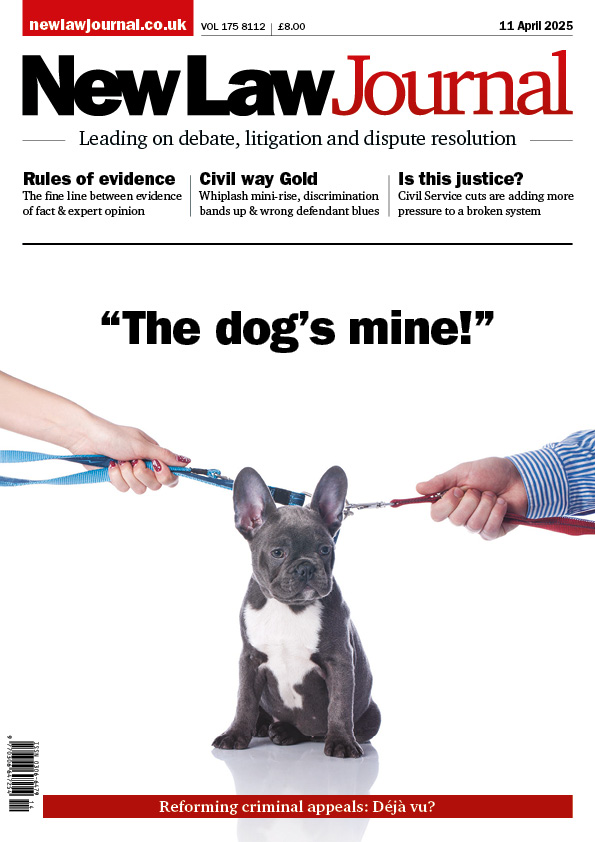THIS ISSUE

In this month’s brief, Ian Smith pays tribute to a titan of industrial relations & applauds the brevity of judgments in days gone by
In days gone by, judges wrote shorter judgments, barrister Ian Smith, emeritus professor of employment law at the Norwich Law School, UEA, writes in his latest employment law update for NLJ. Surely, they can’t have more time on their hands now?
How close is too close? Intellectual property barrister Professor Mark Engelman, 4-5 Gray’s Inn, considers the concept of trade mark dilution, in this week’s NLJ.
Is the UK playing catch-up in its lack of laws surrounding pet disputes? Shivi Rajput considers the current treatment of four-legged family members
The Chancellor plans to cut 15% from the civil service budget in the next five years. How would this affect the courts and justice system? In this week’s NLJ, Mark Jones, partner, and Alex Curran, senior associate, Payne Hicks Beach, look at the potential impact from a range of perspectives if the Ministry of Justice budget is cut by 15%, including the criminal courts—where the backlog is so extreme that ‘at Snaresbrook Crown Court, trials for suspects on bail are currently being listed in November 2028’.
The Law Society and Bar Council have endorsed a Europe-wide statement of support for US lawyers targeted by President Donald Trump’s administration.
Judicial bullying and poor conduct appear to be increasing, according to Criminal Bar Association (CBA) research.
A company seeking an anti-suit injunction has lost at the Court of Appeal due to its failure to provide enough information.
Job applicants are not protected as whistleblowers, the Court of Appeal has confirmed.
MOVERS & SHAKERS

Freeths—Ruth Clare
National real estate team bolstered by partner hire in Manchester

Farrer & Co—Claire Gordon
Partner appointed head of family team

mfg Solicitors—Neil Harrison
Firm strengthens agriculture and rural affairs team with partner return
NEWS
Conveyancing lawyers have enjoyed a rapid win after campaigning against UK Finance’s decision to charge for access to the Mortgage Lenders’ Handbook
The Crown Prosecution Service (CPS) has launched a recruitment drive for talented early career and more senior barristers and solicitors
Regulators differed in the clarity and consistency of their post-Mazur advice and guidance, according to an interim report by the Legal Services Board (LSB)
The dangers of uncritical artificial intelligence (AI) use in legal practice are no longer hypothetical. In this week's NLJ, Dr Charanjit Singh of Holborn Chambers examines cases where lawyers relied on ‘hallucinated’ citations — entirely fictitious authorities generated by AI tools
The Solicitors Act 1974 may still underpin legal regulation, but its age is increasingly showing. Writing in NLJ this week, Victoria Morrison-Hughes of the Association of Costs Lawyers argues that the Act is ‘out of step with modern consumer law’ and actively deters fairness









